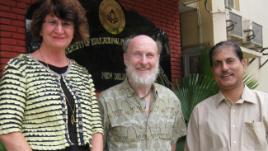Adjunct Prof contributes to Aus-India project on transnational education
Published on 14 June, 2011
Professor Debbie Clayton has authored a chapter in the recently released book Quality Assurance in Transnational Higher Education : The Experiences of Australia and India...
The new book has been produced by the National University of Educational Planning and Administration, India, and the Australian Universities Quality Agency.
The book is now available on the AUQA website via http://www.auqa.edu.au/
An Adjunct Professor of CQUniversity's Faculty of Arts, Business, Informatics and Education, Professor Clayton says the new book, edited by Dr Stella Anthony (AUQA) and Dr Sudanshu Bhushan (NUEPA), was one initiative of the 2009 working group established by the Australian and Indian governments on various education related matters, including quality assurance in higher education.
"Academics, policy makers and quality assurance professionals from both countries contributed chapters to the edited publication," Professor Clayton said.
"It has been developed at a key time for both countries where quality assurance arrangements for the higher education sector are undergoing change, and the issues of monitoring transnational education are a focus."
Professor Clayton indicated that India's Foreign Education Providers bill is still in parliament.
"Once it is passed and implemented, we will better understand the implications of the new system on Australia and other higher education providers offering degrees in that country."
During development of the book, Professor Clayton was the Australian author chosen to travel to India with AUQA Executive Director Dr David Woodhouse and Dr Stella Anthony to assist with critical input into chapter development with Indian authors, Australian authors (in select teleconference sessions), editors and advisors.
"This experience was incredibly enlightening," said Professor Clayton.
"The volume of some provision is impressive, for example, the Indira Gandhi National Open University has 2.6 million students studying their programs by distance and a presence in 36 countries. However, much of the current quality assurance policy focus is on foreign providers delivering programs in India."


